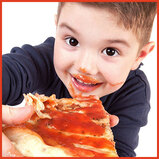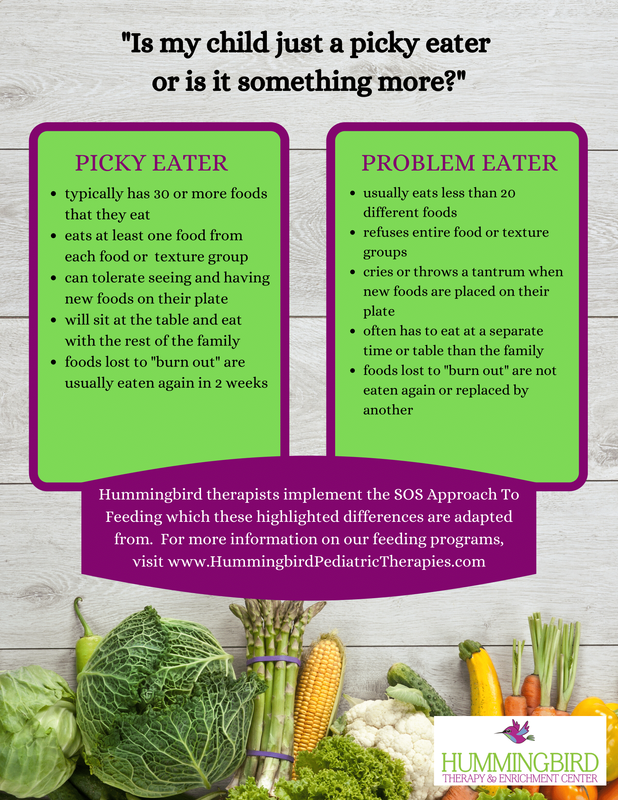Feeding Therapy |
Do you have questions about your child's feeding development? |
Feeding Therapy
FEEDING DISORDERS CAN BE TREATED and it is never too late to seek help for your child. For many people, eating is fun! It is a social tool in which we gather around the kitchen table and share stories and laughs. But not for some children. Eating is the exact opposite. It triggers anxiety, gagging and choking and creates tension within a family. Many times Mom is making a different meal for one child while the rest of the family is eating something else. Sometimes children can not even sit at the dinner table with the rest of their family because of adverse reactions to the smells and sights of foods. This can easily affect the quality of their family’s mealtimes. The good news is that therapy does work!
How can I tell the difference between if my child is a picky eater or if it is something more?

Problems such as aversion to all foods in a particular group or with a particular texture, choking, gagging, vomiting, nasal reflux, or a history of coordination problems with breathing and eating often indicate a need for therapy.
Feeding issues often manifest themselves early in life. An infant who routinely cries and fusses during feeding, or has difficulty transitioning to baby food, a cup, and eventually solid foods by 16 months of age, may be helped by early therapeutic intervention.
Feeding issues often manifest themselves early in life. An infant who routinely cries and fusses during feeding, or has difficulty transitioning to baby food, a cup, and eventually solid foods by 16 months of age, may be helped by early therapeutic intervention.
"Feeding therapy has been a huge game-changer for our son and our entire family. Before meeting with Christina, our son only ate a handful of foods, none of which included any fruits or vegetables. He was very specific about which brands he would eat and was never willing to try new foods. His eating habits were a daily stress factor and made life difficult, especially in terms of being able to eat in restaurants, on-the-go or at someone else's house. Christina quickly realized that his issues mainly centered on having the confidence to try/eat new things. She made eating into a fun game and gave him the power to realize that he COULD do it! Now he is SO proud of himself and is always asking to try new foods. Our entire family has been changed forever because we chose to reach out to Christina. We were skeptical at first, but feeding therapy really does work and can make such a difference in a child's well-being, in addition to the overall family dynamic - we are all happier and healthier as a result. It may seem like a small part of life, but it truly is amazing to be able to go out for dinner and order something for our son off the menu - and it usually includes a fruit or a vegetable! |
F.A.Q.'s
Who does a feeding evaluation?
At Hummingbird Pediatric Therapies, we have speech pathologists and occupational therapists that are specially trained to evaluate and treat your child’s feeding skills.
My child needs feeding therapy, now what?
Feeding therapy is FUN! Really! Our main goal is to take the stress and anxiety out of eating for both parents and child. We start by desensitizing your child to various foods with different textures, colors etc. We do a lot of cooking and playing in the kitchen and reassure your child that we will never force him to eat anything which that in and of itself, sets the stage for your child to experiment with different foods.
The SOS Feeding Approach to Feeding and Our Approach
We are trained in and implement The Sequential Oral Sensory (SOS) feeding approach. This approach is a developmental feeding therapy program that allows the child to interact with the food in a playful, non-stressful way. It helps increase the child’s comfort level by exploring different properties of foods, including the color, shape, texture, smell, taste and consistency.
The SOS approach follows a systematic hierarchy to feeding, from tolerating foods in the room, interacting with foods, smelling, touching, tasting and eventually eating the food. Parent education and involvement are an essential part of the SOS approach. Parents can be directly involved in the sessions.
However, every child is different and unique and we find that some may need a slightly different approach which is why we do not follow this approach strictly with every child. Some children benefit from some aspects of a soft behavioral approach to feeding. SOS and behavioralism are at the opposite ends of the treatment spectrum. We custom tailor our approach for each of our children based on a number of factors that we discuss with you at every step of the way.
The SOS approach follows a systematic hierarchy to feeding, from tolerating foods in the room, interacting with foods, smelling, touching, tasting and eventually eating the food. Parent education and involvement are an essential part of the SOS approach. Parents can be directly involved in the sessions.
However, every child is different and unique and we find that some may need a slightly different approach which is why we do not follow this approach strictly with every child. Some children benefit from some aspects of a soft behavioral approach to feeding. SOS and behavioralism are at the opposite ends of the treatment spectrum. We custom tailor our approach for each of our children based on a number of factors that we discuss with you at every step of the way.
Warning Signs of a Feeding Delay
- Ongoing poor weight gain or weight loss
- Ongoing choking, gagging or coughing during meals
- Ongoing problems with vomiting
- More than once incident of nasal re flux
- History of a traumatic choking incident
- History of eating and breathing coordination problems, with ongoing respiratory issues
- Parents reporting child as being “picky” at 2 or more well child checks
- Inability to transition to baby food purees by 10 months of age
- Inability to accept any table food solids by 12 months of age
- Inability to transition from breast/bottle to a cup by 16 months of age
- Has not weaned off baby foods by 16 months of age
- Aversion or avoidance of all foods in specific texture or nutrition group
- Food range of less than 20 foods, especially if foods are being dropped over time with no new foods replacing those lost
- An infant who cries and/or arches at most meals
- Family is fighting about food and feeding (ie. Meals are battles)
- Parent repeatedly reports that the child is difficult for everyone to feed
- Parental history of an eating disorder, with a child not meeting weight goals (parents not causing the problem, but may be more stressed and in need of extra support

